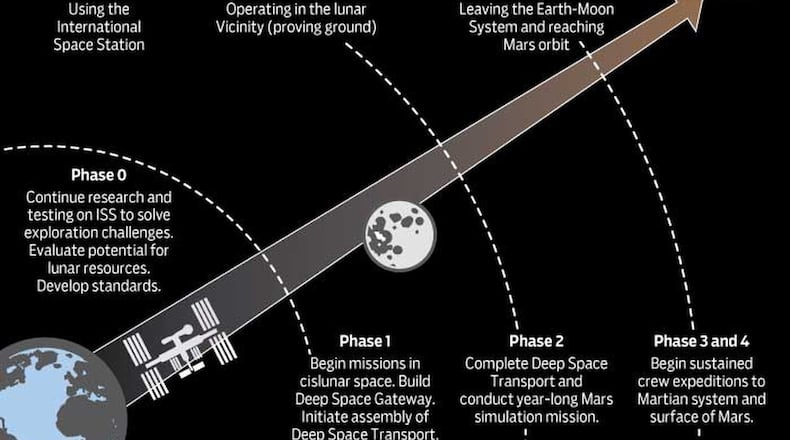Most days, I tune out a lot of the bad news and try to focus on the weather and what good is happening. Yes, there are some good things. Despite our political discourse and the unnecessary politicization of science, the science community continues to work together for a better and brighter world with new, exciting adventures for exploration and study. This gives me great optimism for the future.
Credit: DaytonDailyNews
One great example is the announcement of a new multi-national quest to build a lunar space station. Late last month, the Russian Space Agency, Roscosmos announced they would join a NASA-led effort to build an international human outpost near the moon. The Russians will now join the European Space Agency (ESA), Japanese (JAXA) and Canadian space agencies (CSA) who are already working with NASA, on a plan to construct a modular habitat to be known as Deep-Space Gateway. The habitat will be built in orbit around the moon, and will become a primary destination for astronauts, extending the presence of humans beyond earth’s orbit for the first time since 1972 when Apollo missions ended.
»WEATHER: Get the latest Storm Center 7 forecast
The Deep-Space Gateway, if funded, is expected to be launched on NASA’s giant SLS rocket and serviced by the crews of NASA’s new Orion spacecraft. Once operational, the outpost is expected to pave the way for mission to Mars in the 2030s with the construction of a Deep Space Transport. It is also possible that Deep-Space Gateway will allow for future missions to the moon’s surface and perhaps even a lunar habitat. While some may think that such an undertaking could be a waste of money, it is important to realize the amazing discoveries that occur in space that significantly advance technology and research right here on earth. You can thank the space program for inventions like hand-held vacuum cleaners, breathing apparatus for firefighters, lasers that assist with heart surgery, satellite television, lightning detection systems and so much more.
The International Space Station (ISS) is the primary destination for astronauts and cosmonauts. The ISS is supported by NASA, Roscosmos, JAXA, ESA, and CSA. The ownership and use of the space station is established by intergovernmental treaties and agreements. Interestingly, the station is divided into two sections, the Russian Orbital Segment (ROS) and the United States Orbital Segment (USOS), which is shared by many nations. Currently, the American portion of ISS is being funded until 2024.
The lunar station, Deep-Space Gateway is expected to go under construction in the mid-2020s according to Roscosmos with both US and Russian rockets being used to launch the modules into space.
Now - if we could just get political leaders across the world to learn from the scientific community - and look beyond petty differences, greed and infighting. Working together with other nations can only help the advancement of science and technology, and perhaps someday, develop cures to diseases and famine. Despite our differences and beliefs, we are and will always be a tiny speck of something much, much bigger. The only question is - what will our contribution be?
Eric Elwell is WHIO StormCenter 7 Chief Meteorologist. Contact him at eric.elwell@coxinc.com or follow him on Facebook and Twitter.
About the Author
